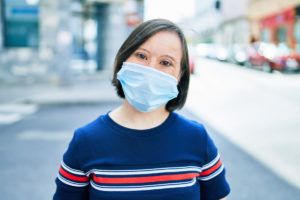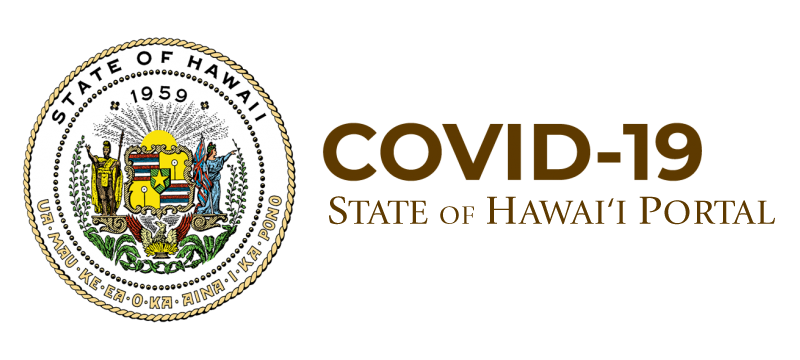
In Hawaii’s efforts to vaccinate our high-risk residents as quickly and efficiently as possible, it’s comforting to know that no one is being left behind or forgotten.
These high-risk target groups include Hawaii’s 3,200 adults with intellectual and developmental disabilities served through the Developmental Disabilities Division (DDD) in the state Department of Health.
With collaboration between the DDD, Behavioral Health Administration and other partners, Hawai‘i has successfully vaccinated the majority of residents with intellectual and developmental disabilities in just the past two months.
“Hawai‘i residents with developmental disabilities often have underlying health conditions that make them more vulnerable to COVID-19. They may also have behavioral health challenges and may not be able to adhere to guidance on social distancing and wearing masks,” says Mary Brogan, administrator of the Department of Health’s Developmental Disabilities Division. “Our advocacy has focused on education to make sure everyone involved in the vaccinations understands the unique situation of these individuals we serve.”
A Hard-to-Reach Population
Since 2014, both federal and state government have strived to empower individuals with disabilities to live independently, be more integrated into the community, and join the workforce.
They may live in home- or community-based settings, such as group homes or adult foster homes. However, Hawai‘i also has many residents with intellectual and developmental disabilities who live at home with their families. They may not fit neatly into the specified high-risk categories, but are still at high risk for COVID-19.
Intensive Triage
Reaching these independent individuals has been a team effort. Mary Brogan meets almost daily with Dr. Albert Yazawa of the Hawai‘i National Guard–representing the Hawai‘i Emergency Management Agency’s vaccination outreach efforts in long-term care facilities–and Dr. Curtis Toma, Medical Director of the Med-QUEST Division (Medicaid) at the Department of Human Services, as well as independent pharmacies statewide.
This working group also benefits from the support of Edward Mersereau, DOH Deputy Director of Behavioral Health. He has been overseeing the state’s vaccine allocations.
They exchange data, geo-mapping information and analytics as they strategize the best way to reach this specific population. Brogan compares the intensity of their triage efforts to a disaster response effort.
“There was no manual for this,” Brogan said, “We had to plan this as we went along. I appreciate the great partnership with Dr. Toma who has been instrumental in problem-solving and anticipating the next steps.” Brogan credits Dr. Toma for determining that the best way to reach homebound residents would be through home visits to deliver vaccinations to each and every adult residential care home, adult foster family home and elder foster home.
Behind-the-Scenes Heroes
As part of this team effort, Brogan praises the independent pharmacies as “true heroes.” She singles out Kerri Okamura, pharmacy director for KTA on Hawai‘i Island as “setting the tone.” KTA has conducted drive-through vaccination events in Hilo, Kona, and Pāhoa, and is also reaching out to individual homes.
The Community Pharmacy Enhanced Services Network—or CPESN–is a clinically integrated, nationwide network of high-performing independent pharmacies that go beyond dispensing prescriptions to serve their communities. They provide high-quality, patient-centered enhanced services to improve health outcomes and lower healthcare costs. Our local network consists of 27 pharmacies in each of Hawaii’s four counties. Fourteen of these pharmacies have been helping with the COVID-19 vaccinations.
“The fees they receive for administering the vaccines barely cover their costs. Unlike the PODs (Points of Dispensing), they must go to individual homes and take the time to educate each family, including primary caregivers,” Brogan said. “They have been persistent in their outreach efforts and have even had to overcome language barriers.”
Okamura serves as Hawaii’s designated liaison with the national CPESN group. “Independent pharmacies are invested in the community,” she explains. “We were excited to be given the opportunity to care for and help vaccinate our most vulnerable community members. Dr. Toma called each of the pharmacies individually to ask us to participate, and we have been working as a group with him and Mary to be able to scale up,” Okamura continues. “This is what can happen when there is collaboration with others!”
Next Steps – Conquering the Digital Divide
Brogan and her team are already tackling the next set of challenges presented by the “digital divide” between people who do and don’t have access to technology.
For those without computers and/or connectivity, Brogan’s team has resorted to postal “snail mail.” And just last week they launched a call center—manned by a small team of DDD employees assigned to follow-up with individuals who have yet to be vaccinated. For those who want the vaccine, Brogan’s team will help them register online or arrange for in-home vaccinations.
Brogan calls this successful endeavor “an invaluable journey” requiring plenty of collaboration, and the effort is ultimately rewarding knowing that no one is being left behind.
Denby Fawcett: Why So Few People Are Getting The New Covid Shot
Experts are worried about the lack of interest as people are still suffering from the virus and long Covid. By Denby Fawcett Original article on Civil Beat, November 7, 2023 I keep a card in my [...]
Federal Public Health Emergency (PHE) for COVID-19 ends on May 11, 2023
HONOLULU, HI –The federal Public Health Emergency (PHE) for COVID-19, declared under Section 319 of the Public Health Service Act, will expire at the end of the day on May 11, 2023. As the PHE [...]
Seniors now eligible for additional COVID-19 bivalent booster dose, COVID vaccine recommendations simplified
HONOLULU, HI – The Hawai‘i Department of Health (DOH) supports the latest recommendations announced yesterday by the Centers for Disease Control and Prevention (CDC), allowing an additional dose of the bivalent booster against the virus [...]
Hawai‘i COVID-19 hospitalizations on the rise
HONOLULU, HI – The Hawai‘i Department of Health (DOH) reports a rise in the rate of COVID-19 hospitalizations. The number of total positive COVID-19 hospitalizations has increased over the past week (3/26 – 4/4) from [...]
Wastewater Samples Show Higher COVID Concentrations & New Subvariant
The Hawai‘i State Department of Health’s most recent Wastewater Surveillance Report documents two significant developments about COVID-19 in Hawai‛i. Higher concentrations of the virus that causes COVID-19 The arrival of the XBB.1.5 subvariant Higher concentrations [...]
Bivalent boosters for keiki as young as 6 months
Updated COVID-19 bivalent boosters are now available in all counties for keiki as young as six months of age. The U.S. Food and Drug Administration (FDA) amended the emergency use authorization for the bivalent boosters [...]
